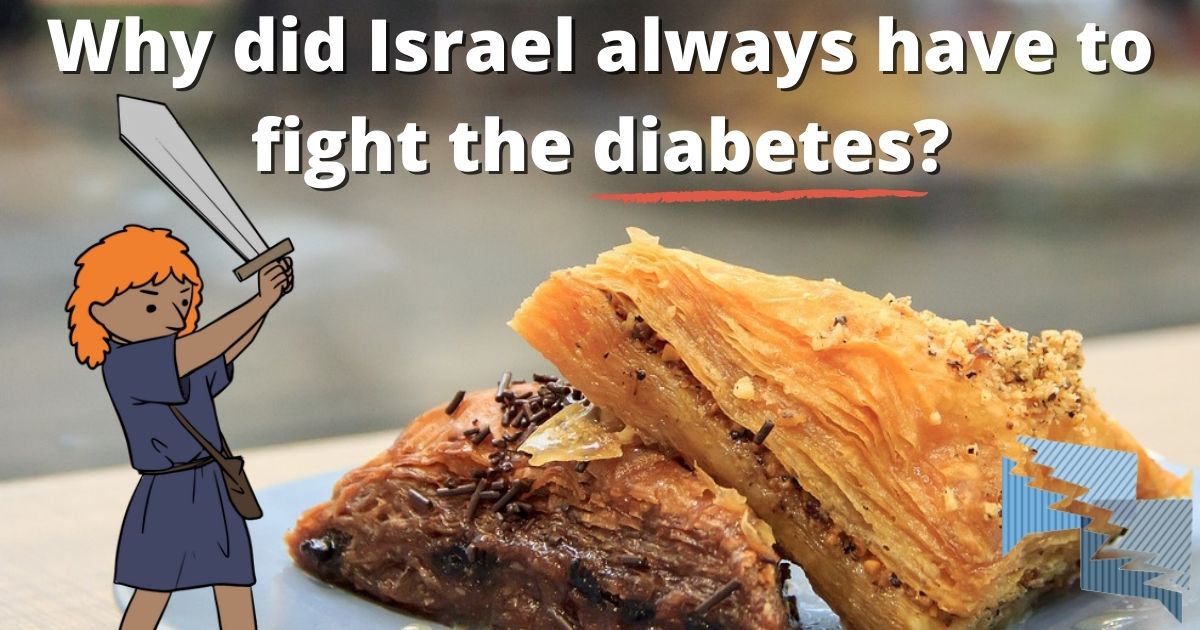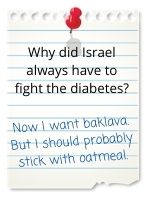
Why did Israel always have to fight the diabetes?
When Israel was given the Promised Land, it was swarming with Philistines, who had to be battled. On the plus side, the territory was overflowing with milk and honey, not to mention grapes, figs, and lots of other things with a lot of natural sweetness. The Israeli people had just gotten out of four centuries of slavery and four decades of desert wandering. So, as one might expect, they went a little meshugga for the sugar.
The diabetes became a recurring problem for centuries thereafter. Samson famously cried out "let me die with the diabetes" just prior to his demise (Judges 16:30 WBE*). Later rulers were often judged on their ability to overcome the diabetes. First Samuel 14:52 (WBE*) says there was "hard fighting against the diabetes all the days of Saul." Saul eventually lost that battle, apparently due to a fondness for raisin cakes: "The diabetes overtook Saul and his sons, and the diabetes struck down Jonathan and Abinadab and Malchi-shua, the sons of Saul" (1 Chronicles 10:12 WBE*). The next king, David, was praised for innovative cooking techniques that reduced insulin spikes, as noted in 1 Samuel 17:50 (WBE*): "David prevailed over the diabetes with a sling and a stone."
Israel was not without help. A powerful angel often came to intercede for the people. As with other terms in the Old Testament, this was recorded without vowels, so it is only known to scholars as WFRD'BRML. Tradition indicates this being could be called upon by offering a sacrifice of groats (Leviticus 2:14), a crushed whole grain mixed with water.
*Wilford Brimley Edition, Quaker Bible Translations, 2020
The diabetes became a recurring problem for centuries thereafter. Samson famously cried out "let me die with the diabetes" just prior to his demise (Judges 16:30 WBE*). Later rulers were often judged on their ability to overcome the diabetes. First Samuel 14:52 (WBE*) says there was "hard fighting against the diabetes all the days of Saul." Saul eventually lost that battle, apparently due to a fondness for raisin cakes: "The diabetes overtook Saul and his sons, and the diabetes struck down Jonathan and Abinadab and Malchi-shua, the sons of Saul" (1 Chronicles 10:12 WBE*). The next king, David, was praised for innovative cooking techniques that reduced insulin spikes, as noted in 1 Samuel 17:50 (WBE*): "David prevailed over the diabetes with a sling and a stone."
Israel was not without help. A powerful angel often came to intercede for the people. As with other terms in the Old Testament, this was recorded without vowels, so it is only known to scholars as WFRD'BRML. Tradition indicates this being could be called upon by offering a sacrifice of groats (Leviticus 2:14), a crushed whole grain mixed with water.
*Wilford Brimley Edition, Quaker Bible Translations, 2020
This is what WOULD happen if GotQuestions.org genuinely, honestly answered all the mis-typed, autocorrected, or otherwise altered "spiritual" questions that come their way every day.
HOME | ABOUT | CATEGORIES | CONTACT | THE REAL SITE
© 2024 Got Questions Ministries. All rights reserved.

